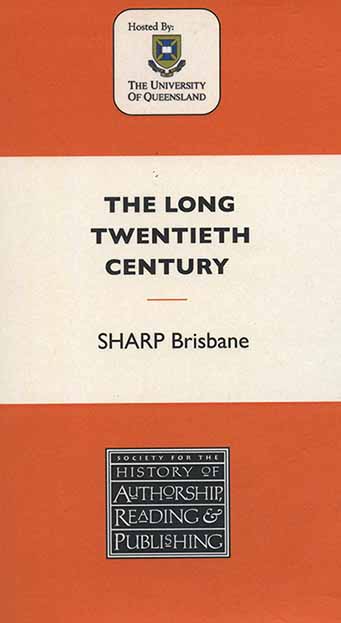Background on Society for the History of Authorship, Reading & Publishing
- Organization history by Robert L. Patten, 2009.

Conference program, 2011.
At the beginning of August 1991, during a weekend conference on "Masterpieces in the Marketplace" sponsored by the Dickens Project at the University of California at Santa Cruz, Simon Eliot and Jonathan Rose proposed founding an international organization devoted to global book history and print culture, to be called the Society for the History of Authorship, Reading and Publishing, or SHARP. Those in attendance enthusiastically endorsed the proposal, and a volume of essays from the conference, Literature in the Marketplace (edited by John Jordan, Director of the Dickens Project, and Robert L. Patten), was subsequently published by Cambridge University Press, a prototype for subsequent SHARP publications. During the next eighteen months Jonathan Rose established SHARP as a not-for-profit organization eligible to receive grants and exempt from US income tax. Simultaneously Simon Eliot recruited members and helped to organize conferences in Britain and Europe. Meanwhile Patrick Leary, already unofficial webmaster, designed, initiated, and managed the invaluable communication facility, SHARP-L, which went on-line March 17, 1992.
The first annual SHARP conference was held in New York City in the summer of 1993. At the first Annual General Meeting an Executive Committee and a Board of Directors were elected. Subsequent conferences eventually established a rhythm of meeting in alternate years in North America and elsewhere.
The annual meetings were in time supplemented by smaller gatherings, at first called "regional" conferences, but later changed to "focused conferences", in part because the focus of these gatherings need not be geographic. Such gatherings have been held in Sydney, Australia; Kolkata, India; Cape Town, South Africa; Venice, Italy; and Copenhagen, Denmark.
From the start SHARP attracted attention. Its first publication, the quarterly SHARP News, initially edited by Jonathan Rose, communicated information about programs in book history, reviewed publications and exhibitions, and informed members of upcoming events. SHARP launched an annual volume, Book History, in 1998; the Council of Editors of Learned Journals named it “Best New Journal” in December 1999. The CELJ awards committee commended its "impressive range" and "sustained engagement with the subject" and predicted "real staying power on the academic landscape." The SHARP website, also initiated and conducted by Patrick Leary, debuted at the 1995 Edinburgh conference. It received high praise from Edward Tenner in the 9 March 2007 Chronicle of Higher Education: "The goal in the next decade or so should be to prepare students to be discerning users of, and contributors to, all media. An excellent starting point on the Web is the site of the Society for the History of Authorship, Reading, and Publishing."
Outside support for SHARP’s activities has come from many sources. Especially generous has been the Gladys Krieble Delmas Foundation, which has provided funds to support students and independent scholars attending annual conferences, has partially underwritten expenses incurred in holding a focused conference on the book trade in Venice in 2007 and publishing its proceedings, and most recently has contributed to SHARP’s funding for an annual conference held in Helsinki in August 2010. A prize for the best book in book history was generously endowed by the DeLong family: from 2004 it has been known as the George A. and Jean S. DeLong Book History Book Prize. Book History has itself funded a prize for the best essay by a graduate student submitted to and accepted for publication in the journal. And for many years a portion of the registration fee for each annual conference has been set aside to support student and independent scholar travel to the subsequent year's conference.
Furthermore, the SHARP Award for Distinguished Achievement has been presented twice, in 2004 to Bibles imprimèes du XVe au XVIIIe siècle conservèes à Paris, a catalogue of the early modern printed bibles that survive in the main Parisian libraries, edited by Martine Delaveau and Denise Hillard; and in 2006, to the Archive of Publishers’ Records at the University of Reading (England) Library supervised by Michael Bott, and to the Waterloo Directory of English Newspapers and Periodicals, 1800-1900, general editor John North.
SHARP also has established affiliations with other learned societies and associations, including the Modern Language Association, the American History Association, the Bibliographical Society of America, American Society of Eighteenth-Century Studies, the Renaissance Society of America, the Library History Group, and a dozen or so others. More recently, it has created a network of international liaisons. These country representatives introduce scholars within their home countries to SHARP, its activities, and the many benefits of being a member; SHARP's current network of representatives extends from Australia to South Africa and includes representatives in Japan, Denmark, Germany, India, Canada, Israel, France, New Zealand, the Netherlands, Sweden, and Slovenia. The American Printing History Association chose SHARP as the winner of its Institutional Award for 2001. This award is given each year to an institution that has made “distinguished contributions to the study, recording, preservation, or dissemination of printing history.”
By 2006, SHARP had outgrown its original institutional structures. Over the next four years it adopted a new Constitution, making provision for more democratic electoral procedures and a wider range of administrative responsibilities and international representation. It also moved all its business management and publications to the Johns Hopkins University Press, and completely redesigned its website. Efforts are underway to make SHARP materials available in several languages and to interact more extensively with international learned societies in history, library sciences, and literature. Membership continues to grow from all parts of the world.

